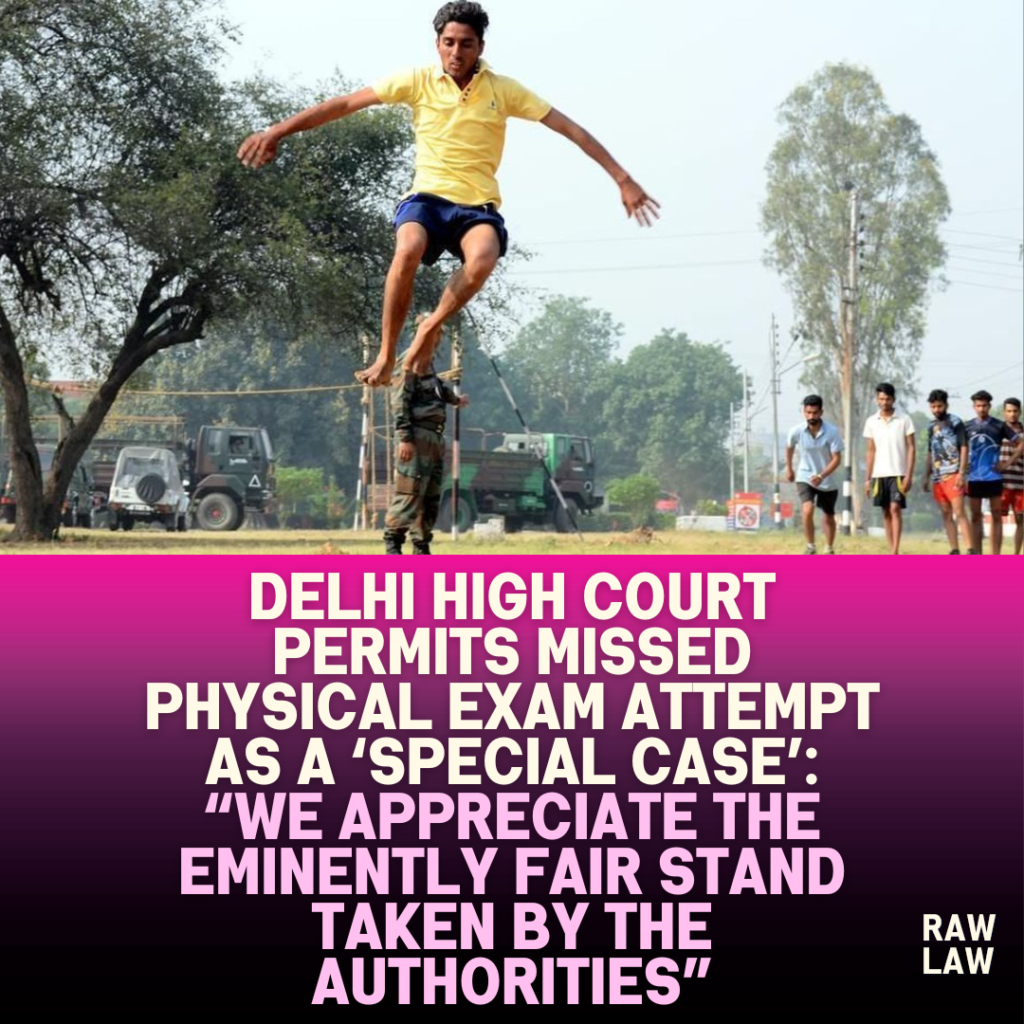Court’s Decision
The Delhi High Court disposed of the writ petition after recording the respondents’ consent to allow the petitioner to appear for the physical examination scheduled on 11 August 2025. This concession was granted as a special case in view of the petitioner’s inability to attend the original test on 16 July 2025 due to unavoidable reasons. The Court expressly noted that this decision was not to be treated as a precedent. Pending miscellaneous applications were also disposed of.
Facts
The petitioner approached the Delhi High Court after being unable to attend a scheduled physical examination for recruitment or service-related evaluation on 16 July 2025. He attributed his absence to unavoidable circumstances and sought permission to appear in the test at a later date. The respondents initially held the examination as per schedule but had also arranged for certain other candidates who missed the 16 July test to appear on 11 August 2025.
Issues
Whether the petitioner, who missed the scheduled physical examination on 16 July 2025 due to unavoidable reasons, could be allowed to participate in the re-scheduled test on 11 August 2025.
Petitioner’s Arguments
The petitioner submitted that his absence on 16 July 2025 was caused by unavoidable and genuine reasons beyond his control. He contended that denial of a subsequent opportunity would cause him irreparable prejudice despite his eligibility and readiness to participate in the examination process. He urged the Court to direct the authorities to permit him to take the physical test along with other candidates who had been granted the same opportunity.
Respondent’s Arguments
The respondents, through their Special Public Counsel, after receiving instructions from the concerned CRPF officer present in Court, agreed to permit the petitioner to appear in the physical examination on 11 August 2025. This was stated to be a one-time concession, given without any intention to create a precedent or confer any general right on similarly situated individuals.
Analysis of the Law
The Court recognised that recruitment processes and service examinations are governed by strict timelines and procedures to ensure fairness and uniformity. However, exceptional circumstances may warrant equitable relief, particularly where the authorities themselves have fixed an additional date for other similarly placed candidates. The legal principle underlying such discretion is rooted in Article 226 of the Constitution, which empowers High Courts to issue appropriate directions in the interests of justice. The Court’s order, however, carefully preserved the integrity of the process by clarifying that the relief granted was case-specific.
Precedent Analysis
Although the Court did not cite specific precedents, the principle applied aligns with judicial trends where courts have permitted candidates to participate in recruitment processes if the absence was due to justifiable reasons and no prejudice would be caused to the process or other candidates. This approach balances the rule of law with equitable considerations.
Court’s Reasoning
The Court commended the “eminently fair stand” taken by the respondents and their officer in agreeing to accommodate the petitioner. This was considered an equitable resolution, especially as the petitioner’s situation was not unique—the authorities had already arranged for a supplementary test for others. The Court emphasised that its order was not intended to serve as a binding precedent for future cases.
Conclusion
The writ petition was disposed of with the direction that the petitioner be allowed to participate in the physical examination scheduled on 11 August 2025. All pending applications were also disposed of. A copy of the order was directed to be given dasti to the counsel.
Implications
This order underscores the Court’s willingness to intervene in recruitment and examination processes in exceptional situations, provided such relief does not undermine procedural fairness. It also reaffirms that case-specific concessions do not automatically extend to others unless explicitly recognised by law or precedent.
FAQs
Q1: Can a missed physical examination be rescheduled through a court order?
Yes, in exceptional circumstances where unavoidable reasons prevented attendance and no prejudice is caused to the process, courts may direct authorities to allow participation in a later test.
Q2: Does this order mean all candidates missing an exam will get a second chance?
No. The Delhi High Court specifically stated that this decision was not intended to be a precedent and applies only to the petitioner’s unique situation.
Q3: What factors influence such discretionary relief?
Courts consider fairness, genuine reasons for absence, potential prejudice to other candidates, and whether similar opportunities have been granted to others in the same process.
